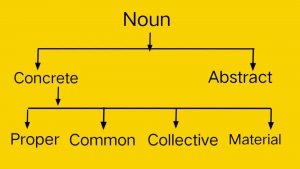In this post of inflection Of Nouns we are going to discuss one of the most essential parts of speech in English grammar. It’s very important to know for making word formation such as from adjective to Noun, Noun to big brother, or from adjectives to adverbs, gender number, case. All about Nouns and its classification in Hindi language with lots of examples. Stay connected and keep reading.
Inflection Of Nouns (संज्ञा)
Classification (वर्गीकरण)
Noun का वर्गीकरण इस प्रकार है:

Noun : खासकर दो प्रकार के होते हैं :
(i) Concrete
(ii) Abstract
(i) Concrete Noun :
जिस शब्द से ऐसी वस्तु का का बोध हो जिसका स्थूल रुप हो और जिसे हम अपने Sense of organs के द्वारा उसके बारे में जानकारी मिल सकें या उस स्थूल रूप वस्तु को हम आॉंख से देख सकें, हाथ से स्पर्श कर सकें, नाक से सूंघ सकें, ज़बान से स्वाद ले सकें, इत्यादि उसे Concrete Noun कहा जाता है। जैसे-
Hamid, Mira, Book, Pen, Got, Flower, Rice, Delhi, etc.
(ii) Abstract Noun:
उस शब्द को कहते हैं जिससे ऐसी वस्तु का ज्ञान हो जिसका कोई स्थूल या ठोस रूप नहीं हो बल्कि वह सूक्ष्म हो और उसकी मात्र कल्पना की जाय और उसे सिर्फ मस्तिष्क द्वारा समझा जाय; जैसे-
Kindness, honesty, virtue, wisdom, witness, cleverness, health, sleep, memory, enjoyment, grief, poetry, growth etc.
1. The Concrete Noun
Concrete Noun के चार प्रकार होते हैं:
- Proper Noun ( व्यक्तिवाचक संज्ञा )
- Common Noun ( जातिवाचक संज्ञा )
- Collective Noun ( समूहवाचक संज्ञा )
- Material Noun ( दृव्यवाचक संज्ञा )
1. The Proper Noun ( व्यक्तिवाचक संज्ञा )
A proper noun is the name of one particular person, place, thing, event or group of persons, place and notable events; as- Fahad, Patna, Kohinoor Mount Everest, The East India, The Geet, The Quran, The Ganges, The French Revolution etc.
“किसी खास व्यक्ति, स्थान, वस्तु और घटना के नामों को व्यक्तिवाचक संज्ञा (Proper Noun) कहते हैं।”
Proper Noun नीचे दिए गए चीजों का बोध कराता है:
(i) अगर Proper Noun एक से अधिक शब्दों का हो तो उसे Compound Proper Noun कहते हैं और उसके हर एक शब्द का पहला अक्षर Capital letter से होता है। जैसे- United States of America, Mohandass Karamchand Gandhi, Ravindra Nath Tagore, The Merchant of Venice.
(ii) यह किसी खास घटना का भी बोध कराता है। जैसे- The French Revolution, The Industrial Revolution of England.
(iii) यह दिन, पर्व, ग्रहों के नाम का बोध कराते हैं। जैसे- Monday, Moon, Sun, Durga Puja, Holi.
(iv) नदी, समुन्द्र, महासागर, गल्फ, खाड़ी, झील के नाम। जैसे- The Black sea, The Ganges, The Atlantic Ocean, The Gulf of Finland, The Bay of Bengal.
2. The Common Noun (जातिवाचक संज्ञा )
A common or a class noun denotes no person or thing in particular, but is common to any , every person or thing of the same kind; as- man, book, country, dog , cow boy, chair, girl, town etc.
” किसी विशेष व्यक्ति, स्थान, वस्तु का पता नहीं चले लेकिन उनकी जाति का पता चले तो उसे ‘जातिवाचक संज्ञा’ ( Common Noun) कहते हैं।
Common Noun और Proper Noun में अंतर
1. जब किसी proper Noun से व्यक्ति विशेष का बोध न होकर किसी पद या पदवी का पता चले या व्यक्तियों या चीजों का वर्ग का पता चले तो ऐसी हालत में वह proper Noun common Noun हो जाता है। जैसे- Sultan, Caliph, Czar, Ceaser, Maharajah इत्यादि से उन व्यक्तियों का बोध होता है जिनकी पदवी हो। तो ऐसी हालत में वह proper Noun, Common Noun के समान
2. जब proper Noun से किसी व्यक्ति विशेष का बोध न होकर उन व्यक्तियों का समान गुणवाले व्यक्तियों का बोध हो तो ऐसी हालत में वह proper Noun, Common Noun के समान हो जाता है। जैसे – Kalidas is the Shakespeare of India. India has produced a number of Jawaharlals.
Proper Noun और Common Noun के संबंध में Wood महोदय ने कहा है-
” A proper Noun is a name which a person, a place, or an animal has its own, as distinguished from the common noun, which is the name which it shares with other things, persons, or animals of the same kind.”
3. The Collective Noun (समूहवाचक संज्ञा )
A collective Noun is a name of group or collection of persons or things taken together and spoken of as one whole; as- Team, fleet, flock, crowd, jury, family, class, band.
“जिस शब्द से किसी व्यक्ति-समूह या वस्तु-समूह का बोध हो, उसे समूहवाचक संज्ञा’ ( Collective Noun) कहते हैं।”
जैसे- Army से किसी सैनिक का बोध नहीं होता है, बल्कि सैनिकों के समूह या झुंड का बोध होता है। Fleet का अर्थ होता है- जहाजों का समूह। अतः Fleet कहने से जहाज़ों के समुदाय या झुंड का बोध होता है।
जिस collective Noun से उसके अंतर्गत व्यक्तियों का अलग-अलग बोध हो उसे Noun of Multitude कहते हैं। (When a collective noun is so used that the individuals denoted by it are though of separately and not as a whole, it is called a Noun of Multitude); जैसे-
Collective Noun
A. The jury consists of five persons.
B. Here is a big crowd.
C. The mob was dispersed by the police.
Noun of Multitude
A. The jury were divided in their opinions.
B. The crowd were fighting among themselves.
C. The mob were shouting.
(i) कुछ ऐसे Collective Nouns हैं; जैसे- people, the elite, the gentry, the police इत्यादि जो हमेशा Plural होतें हैं और इनके साथ Plural verb का प्रयोग होता है।
(ii) कुछ ऐसे Collective Nouns हैं; जैसे- Machinery, luggage, furniture, scenery, clothing जो हमेशा singular होते हैं और इनके साथ singular Verb का प्रयोग करते हैं।
(iii) Noun of Multitude समूह के अलग अलग व्यक्तियों के बारे में बोध कराता है। इसका Noun singular number में रहता है।
4. The Material Noun ( दृव्यवाचक संज्ञा )
“A material Noun are things which may only be thought during a mass .” as- bread, gram, flour oil, water, cotton, silver, fish etc.
“दृव्यवाचक संज्ञा किसी वस्तु या पदार्थ अथवा द्रव्य का नाम है जिसके बारे में सिर्फ ढेर या परिमाण के रूप में सोचा जायें।”
(i) इसके छोटे-छोटे अंश को भी वही नाम दिया जाता है, जो नाम इसके सारे पुंज (mass / bulk ) का है। जैसे- Gold, ghee, Milk के अंश का भी वही नाम है, जो सारे पुंज का है। अतः ये Material Nouns हैं।
Right ! This was an inflection Of Nouns in English grammar! Thank you




